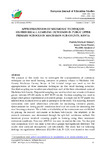| dc.description.abstract | The purpose of this study was to investigate the appropriateness of mnemonic techniques on free recall learning outcomes in primary schools in Machakos SubCounty, Machakos County, Kenya. A 2x4 factorial design was used to test the appropriateness of three mnemonic techniques on free recall learning outcomes. Stratified sampling was to select one school from each of the three educational zones of Machakos Sub-County. Purposeful sampling was used to select four schools with mean grades between 279-281 marks in 2017 KCPE results. Random sampling was used to assign intact groups experimental and control groups. A sample size of 317 pupils was selected from standard seven pupils to participate in the study. The following research instruments were used: observation schedules for monitoring treatment process, Questionnaires for testing pupils’ satisfaction level and test scores for measuring free recall learning outcomes. The validity and reliability of the instruments was established by piloting the research instruments in Kathiani Sub-County. The reliability of the research instrument was determined through the split-half correlation method. The treatment process involved exposing pupils to learning using three mnemonic instruction conditions. Two-way ANOVA was used to analyse the data. Post-hoc pair wise comparison (LSD) was done to test which groups had significant difference. The results were analyzed descriptively and inferentially. The study had the following findings: no significance differences (F(3,318)= 2.26, P> 0.05) were found in free recall learning outcomes between learners who were taught using the three mnemonic techniques hence none of the three mnemonic techniques was found to be more appropriate for free recall learning tasks. The study recommended that, teacher trainees need to be trained on how to teach using mnemonic techniques and similar study should be replicated with samples drawn from students in secondary schools, colleges and Universities. | en_US |

